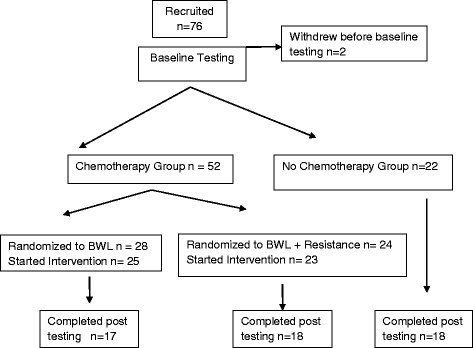Impact of a behaviorally-based weight loss intervention on parameters of insulin resistance in breast cancer survivors
- PMID: 29587682
- PMCID: PMC5872579
- DOI: 10.1186/s12885-018-4272-2
Impact of a behaviorally-based weight loss intervention on parameters of insulin resistance in breast cancer survivors
Abstract
Background: Breast cancer survivors with excess weight are more likely to have negative breast cancer outcomes. Biomarkers related to insulin resistance may help explain this negative association. Weight loss is associated with improvements in insulin sensitivity. Our goal was to identify the impact of a behaviorally based weight loss intervention on indices of insulin resistance.
Methods: Overweight, early stage breast cancer survivors who completed initial cancer therapy were enrolled in a 6 month behaviorally based weight loss intervention that included calorie reduction, exercise and behavior modification. Biomarkers related to insulin resistance were obtained at baseline and after the intervention. Results from participants who achieved ≥5% weight loss were compared to those who lost less weight.
Results: Despite not having diabetes as a preexisting diagnosis prior to the study, 69% of all participants were considered to have pre-diabetes or diabetes at baseline based on American Diabetes Association definitions. Participants who achieved ≥5% weight loss had significantly lower fasting insulin, AUC insulin, and insulin resistance as measured by HOMA-IR. Beta cell function decreased as anticipated when insulin resistance improved. Additionally, leptin levels declined.
Conclusions: Breast cancer survivors who achieved ≥5% weight loss demonstrated significant improvements in indices of insulin resistance. Despite an exclusion criteria of diabetes at the time of enrolment, a high proportion met criteria for pre-diabetes or diabetes at baseline. Pre-diabetes appears to be under recognized in overweight breast cancer survivors. Behaviorally based weight loss interventions can result in weight loss and improvements in biomarkers related to breast cancer outcomes and additionally may decrease the chance of developing diabetes.
Trial registration: NCT01482702 4/12/2010 (retrospectively registered). https://clinicaltrials.gov/ct2/show/NCT01482702?term=Dittus&rank=4.
Keywords: Biomarker; Breast cancer; Weight loss.
Conflict of interest statement
Ethics approval and consent to participate
All procedures followed were in accordance with the ethical standards of the University of Vermont Institutional Review Board and with the Helsinki Declaration of 1975, as revised in 2000. Approval was obtained from the University of Vermont Institutional Review Board. Written informed consent was obtained from all patients for being included in the study.
Consent for publication
Not applicable
Competing interests
The authors declare that they have no competing interests.
Publisher’s Note
Springer Nature remains neutral with regard to jurisdictional claims in published maps and institutional affiliations.
Figures
References
-
- Chan DS, Vieira AR, Aune D, Bandera EV, Greenwood DC, McTiernan A, Navarro Rosenblatt D, Thune I, Vieira R, Norat T. Body mass index and survival in women with breast cancer-systematic literature review and meta-analysis of 82 follow-up studies. Ann Oncol. 2014;25(10):1901–1914. doi: 10.1093/annonc/mdu042. - DOI - PMC - PubMed
-
- Nichols HB, Trentham-Dietz A, Egan KM, Titus-Ernstoff L, Holmes MD, Bersch AJ, Holick CN, Hampton JM, Stampfer MJ, Willett WC, Newcomb PA. Body mass index before and after breast cancer diagnosis: associations with all-cause, breast cancer, and cardiovascular disease mortality. Cancer Epidemiol Biomarkers Prev. 2009;18(5):1403–1409. doi: 10.1158/1055-9965.EPI-08-1094. - DOI - PMC - PubMed
Publication types
MeSH terms
Substances
Associated data
Grants and funding
LinkOut - more resources
Full Text Sources
Other Literature Sources
Medical
Miscellaneous


